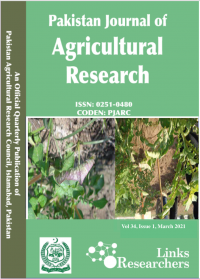Effect of Different Levels of Naphthalene Acetic Acid at Various Phenological Stages of Hybrid Sorghum to Enhance Fodder Productivity
Iqtidar Hussain*, Muzafar Ali, Imam Bakhsh and Muhammad Waqas Imam Malik
ABSTRACT
Goal of the study was to examine optimum level of Naphthalene Acetic Acid (NAA) as foliar application at various growth stages to increase the fodder productivity of hybrid sorghum. A field trial was carried out in RCBD having 3-replications with split-plot arrangement at Agriculture Research Farm, Faculty of Agriculture, Gomal University, Dera Ismail Khan, KP during 2017. Sorghum hybrid cv. “Jumbo+” was used as tested plant material. Four levels of NAA (40, 80, 120 and 160 ml ha-1) were kept in main plots, while three crop growth stages (seedling, tillering and booting) of sorghum were kept in sub-plots. The crop was sown in month of July, while a seed rate of 25 kg ha-1 was used with manual drill. The crop received irrigation at interval of 15 days whilst fertilizer was applied @ 120-90-60 kg NPK ha-1. Results revealed that levels of NAA affected significantly all parameters under study. Maximum number of leaves (16.70 plant-1), leaf area (411.98 cm2), chlorophyll contents (46.84 and 53.50 µg cm-2) at 30 and 60 DAS and fodder yield (35550 kg ha-1) were higher with L4 (120 ml) followed by L3 (80 ml). While L5 (160 ml) and L2 (40 ml ha-1 NAA) were statistically at par. Mean values indicated that NAA level of L4 (120 ml ha-1) had maximum fodder yield (35,550 kg ha-1) as compared to control (13,024 kg ha-1). The results indicated that interaction between 120 ml NAA ha-1) at booting stage showed best results for productivity of fodder hybrid sorghum under agro-climatic condition of Dera Ismail Khan.
To share on other social networks, click on any share button. What are these?






